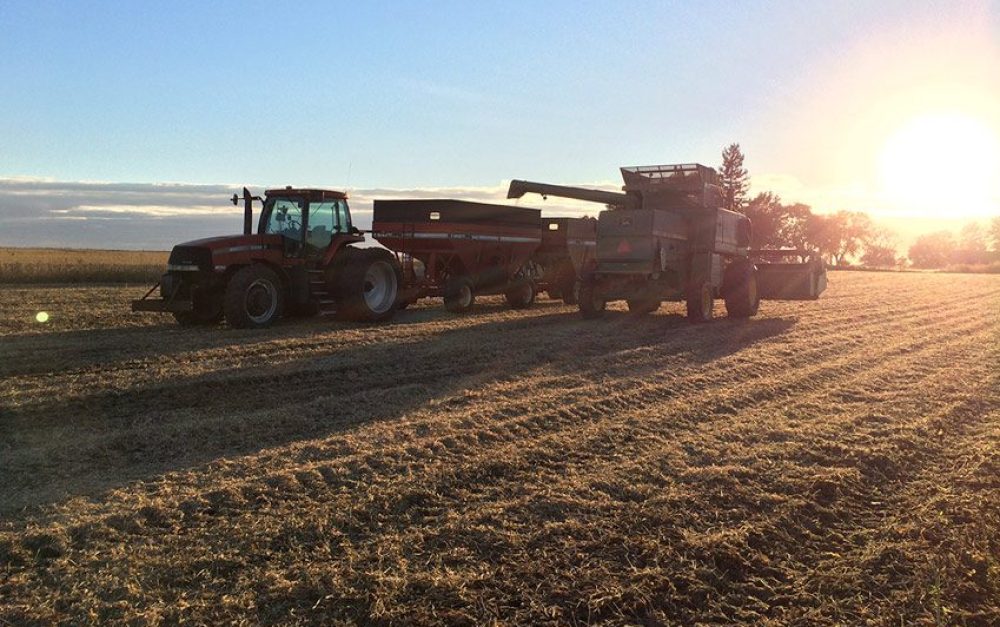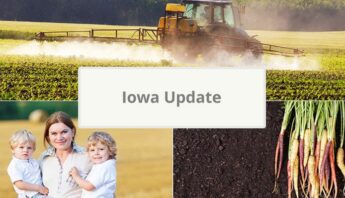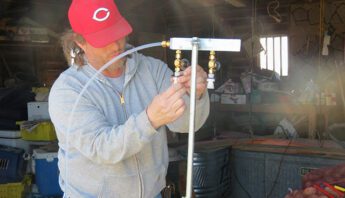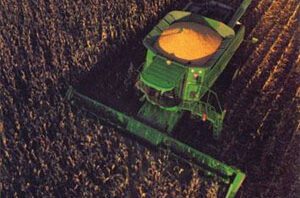Patti Edwardson farms with her partner, George Naylor, near Churdan, Iowa. In 2017, they expect to obtain organic certification on 100 acres of their farm with another 60 acres in transition.
This conversation is the first part of the “Voices from the Frontline” blog series that tells the stories of how pesticides and industrial agriculture directly affect the lives of people across the country.
Patti Edwardson farms with her partner, George Naylor, near Churdan, Iowa. In 2017, they expect to obtain organic certification on 100 acres of their farm with another 60 acres in transition. Patti’s activism is focused on transforming the agribusiness model of farming to one that is more regenerative and agroecological — including the leadership and participation of women to bring food sovereignty to communities around the globe. She has traveled to Cuba and Nicaragua to learn about agroecology and food sovereignty issues and challenges. Patti is a member of Practical Farmers of Iowa, a member of Iowa Citizens for Community Improvement, and she’s on the board of Women, Food, and Agriculture Network (WFAN).
PAN: How does industrial agriculture affect your life and your community as a whole?
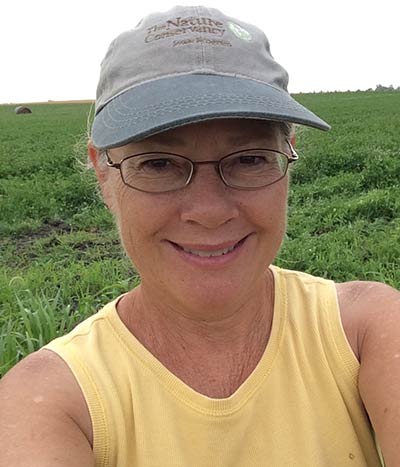 Patti Edwardson: As corn and soybean producers, we are a part of industrial agriculture. With cropland that is highly suitable for growing corn and soybeans, and a system in place that supports those two crops over small grains and livestock on pasture, we have little choice. This industrial system of agriculture is not sustainable — mining our soil for higher and higher yields, using powerful mixes of herbicides on genetically engineered plants and relying heavily on synthetic fertilizers. Our only recourse is to transition to organic production, and we are in that process now.
Patti Edwardson: As corn and soybean producers, we are a part of industrial agriculture. With cropland that is highly suitable for growing corn and soybeans, and a system in place that supports those two crops over small grains and livestock on pasture, we have little choice. This industrial system of agriculture is not sustainable — mining our soil for higher and higher yields, using powerful mixes of herbicides on genetically engineered plants and relying heavily on synthetic fertilizers. Our only recourse is to transition to organic production, and we are in that process now.
But there are many challenges to profitable organic crop production, especially with agricultural globalization. Buyers can buy grain from anywhere in the world, and will buy at the lowest price they can get. That often means that poorly documented organic corn and soybeans are imported into the U.S.
Industrial agriculture has made rural Iowa (and rural America, in general) a sacrifice zone. Fewer and fewer people live in the rural areas of our county as our farmers have been put out of business. Services such as healthcare and government agencies have been cut. Our environment, especially our water quality, has been put in jeopardy. The health of rural residents, farmers and farmworkers is put at risk by the large amounts of herbicides, pesticides, fungicides and animal wastes that are applied to about 23 million acres of corn and soybeans in Iowa.
Industrial agriculture also affects the relationships farmers have with their neighbors. Because farms are no longer diversified, there is little need to share equipment or labor or skills. And, the continuing proliferation of confined animal feeding operations, aka CAFOs, has divided communities, pitting neighbor against neighbor. My mother felt ostracized after speaking out against a proposed dairy confinement near our family farm. Those who see industrial agriculture as a job creator are in favor of these practices, while those of us who see the dangers to the environment and public health are too often labeled as anti-agriculture.
PAN: How has corporate consolidation in pesticide & seed markets affected your farm and livelihood?
Patti: Some companies that once offered both GMO and non-GMO seeds now only offer GMO seeds. That makes it somewhat more difficult to find non-GMO seeds for corn and soybeans. Genetically engineered crops, and the pesticides that go with them, are of great concern as more and more are being developed and planted. The unknown (and known) consequences of these technologies may prove to be devastating to our planet, environmentally, socially and economically.
My biggest concern is the control over our agriculture practices and our food supply that is in the hands of just a few corporations. We (members of society) have some choice now. We may have very little choice in the future.
PAN: Can you explain what happens when your fields are drifted on by a neighboring farm? What agencies are involved and what is the reporting and follow-up procedure?
Patti: At this point in time, we have not experienced any major negative impacts of pesticide drift. My partner has been farming here for 40 years and has a good relationship with his neighbors. That situation could easily change, and has changed for many farmers in Iowa as land ownership and management shifts. Also, with new genetically engineered seeds on the market, dicamba drift is becoming a much bigger concern.
If we were to experience harmful drift, we would first report the incident to the Pesticide Bureau at the Iowa Department of Agriculture and Land Stewardship. And I know several organizations have joined with PAN to increase the effectiveness and improve the process of pesticide drift incident reporting and investigating through legislative efforts at the state level.
PAN: What inspires and supports your commitment to organic and ecological farming?
Patti: I left Iowa after college and didn’t return for 31 years. Now, I can’t imagine living anywhere else. A farm in Iowa is still an exciting, peaceful, beautiful place. I love the land and the connection I have developed to it.
I am also inspired by the young people I have met who want to farm and to do so in an ecological way. I am inspired by my neighboring farmers. They want to do what is right and we need to find ways to support them, not fight against them. I am inspired by the people I have met in Iowa, in other states and in other countries who are fighting for food sovereignty, practicing agroecology and growing foods organically for their communities.
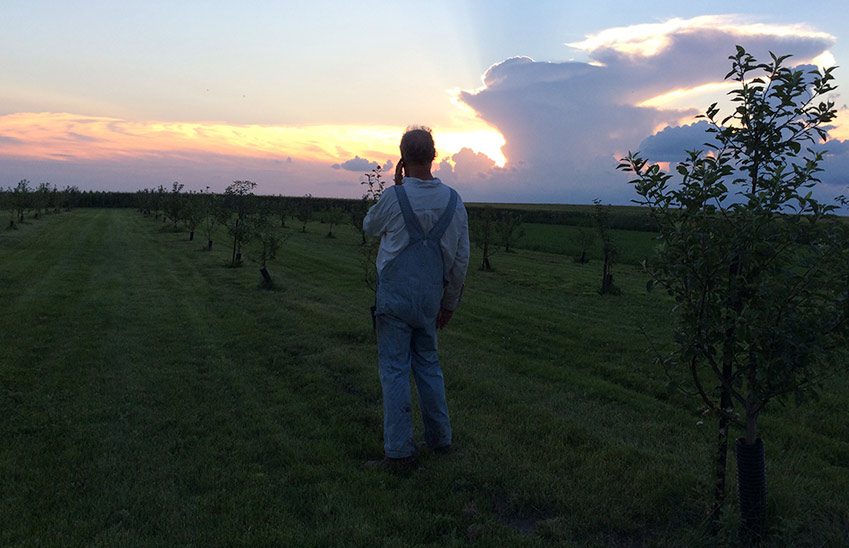
PAN: What is your ideal vision of a just, healthy food system?
Patti: Food sovereignty — the right of peoples in their communities, countries and regions to make democratic decisions about food and farming practices — is absolutely necessary for a just and healthy food system. The needs and hopes of those who produce, distribute, and consume food would be the guiding principles of policies rather than the demands of markets and of corporations.
We would grow foods in agroecological ways that would reduce or eliminate outside inputs and instead use on-farm resources. Farmers and the occupation of farming would be respected and valued. A large portion of the foods people consume would be locally or regionally grown, produced and processed. Workers throughout the food chain would be paid a fair wage with crop prices at a parity level. Trade would be fair, and the growing of foods intended for trade would not replace foods grown to satisfy the needs of a local population. Seed saving and crop diversity would be the norm. Racial and economic injustices would not be tolerated. Environmental protections and animal welfare would be priorities. Water, the sustainer of life, would be clean, protected and equally distributed.
We would all be healthier and happier, and live with less turmoil, violence and uncertainty.
Read about activist Claudio Angulo and native Hawaiian Tiare Lawrence from the Voices from the Frontline series.



